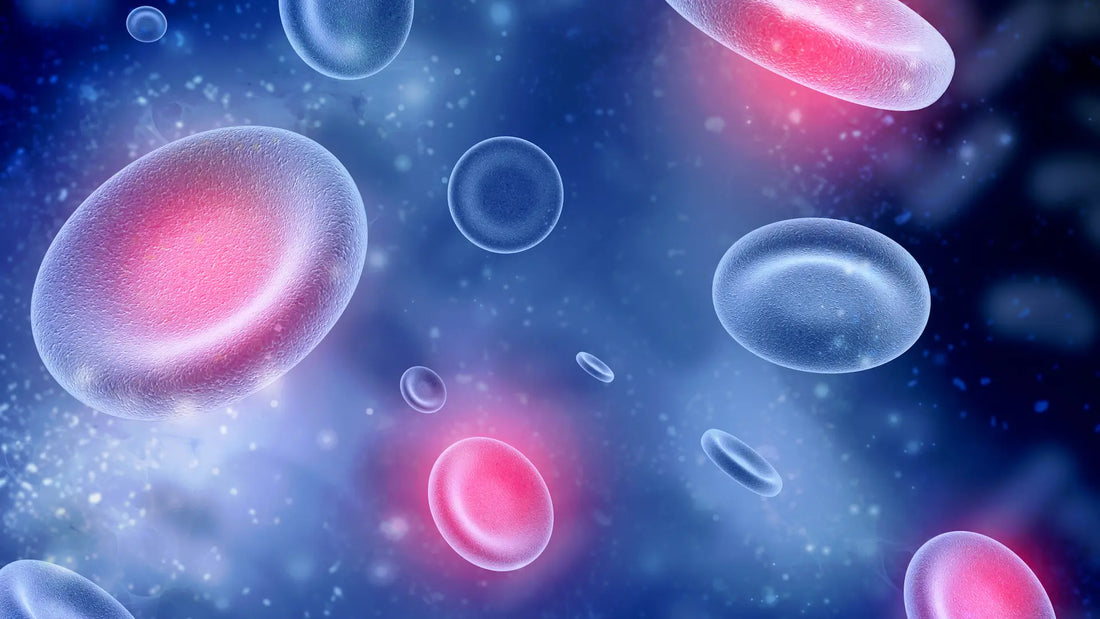The Many Roles of Muscle
Although skeletal muscle may be most well-known for regulating movement and strength, it’s actually involved in many other facets of health as well. In fact, skeletal muscle is responsible for 80% of glucose uptake after you eat, meaning it plays a key role in keeping blood sugar levels steady, enhancing insulin sensitivity, and maintaining your metabolism. (1) Your muscles also release signaling molecules known as myokines, which help keep inflammation under control and promote angiogenesis, or the growth of new blood vessels. (2, 3)
On top of that, your muscle cells are also packed with mitochondria, which are responsible for generating energy to fuel the cells throughout your body. The mitochondria found in your muscles are also essential for balancing levels of calcium and reactive oxygen species, which can damage cells and contribute to chronic disease when they’re not kept in check. (4, 5) Interestingly, research suggests that exercise actually stimulates the turnover of the mitochondria, boosting mitochondrial function and quality in the process. (6, 7)
How Muscle Loss Impacts Health and Longevity
Over time, your lean body mass begins to naturally decline. Eventually, when sarcopenia — defined as the age-related loss of muscle mass, strength, and physical function — sets in, this muscle loss starts to speed up even more. (8) Not only can this make daily tasks much more challenging, but it also increases the risk of falls and fractures. (9) According to a 2023 review, sarcopenia has even been linked to a decrease in quality of life in older adults. (10)
Beyond its impact on physical function and strength, sarcopenia also accelerates aging and disrupts metabolic function. And because muscle helps steady blood sugar levels and keeps insulin working efficiently, muscle loss can even ramp up the risk of metabolic issues like insulin resistance and type 2 diabetes. (11) Plus, sarcopenia can also take a serious toll on heart health. According to one study, people with both sarcopenia and diabetes had an 89% higher risk of cardiovascular disease, a 159% higher risk of heart failure, a 90% higher risk of stroke, and a 56% higher risk of heart attack compared to those without sarcopenia. (12)
Several hallmarks of aging are thought to drive sarcopenia, including mitochondrial dysfunction and cellular senescence, which occurs when damaged cells stop dividing but remain active in the body and continue releasing pro-inflammatory chemicals. (13) But while getting older is inevitable, muscle loss doesn't have to be. Maintaining muscle is even easier than you might think and can help you stay strong, active, and healthy for years to come.
Science-Backed Strategies to Maintain Skeletal Muscle
Making a few minor tweaks to your diet and lifestyle can help preserve and restore muscle mass as you get older, bringing big benefits for both health and longevity. Here are a few simple steps to get started.
Try resistance training
Resistance training is one of the most effective ways to preserve and build muscle as you age and is often recommended as the first-line treatment for sarcopenia. (14) It works by activating a signaling pathway involved in muscle protein synthesis, a process used to build and repair muscle tissue. (15, 16) On top of that, resistance training serves up some bonus benefits to support healthy aging, including stronger bones, better blood sugar and cholesterol control, and improved mental health. (17) To get the most bang for your buck, aim for at least two strength training sessions per week, which can include activities like weightlifting, bodyweight exercises, or resistance band workouts. (18)
Bump up your protein intake
Protein is a major building block of the muscles. In fact, your muscle tissue is actually made up of amino acids, which are individual molecules that combine to form proteins. Because of this, it’s no wonder that fitting plenty of protein-rich foods into your daily diet is key to maintaining muscle mass. (19) According to a review published in Nutrients, upping your intake of protein can limit age-related muscle loss and boost strength and muscle growth, especially when paired with resistance training. (20) As a rule of thumb, try to include around 25-30 grams of protein in each meal and prioritize high-quality sources of protein, like lean meat, poultry, seafood, eggs, and legumes. (19)
Consider supplementation
As you age, your mitochondria start to slow down and become less efficient. Not only does mitochondrial dysfunction play a central role in aging, but it can also speed up sarcopenia and muscle loss. (13) A drop in nicotinamide adenine dinucleotide (NAD+) — a molecule that supports a wide range of cellular processes in the body, including mitochondrial function — is another common characteristic of muscle aging. (21) Supplements like nicotinamide riboside (NR) and nicotinamide mononucleotide (NMN) are designed to boost NAD+ levels and maintain muscle health by enhancing energy production and supporting mitochondrial function. (22)
While more research is still needed, studies show that NAD+ boosters could be a game-changer for anyone looking to preserve muscle and promote longevity. For example, a 2024 meta-analysis of human studies found that supplementing with NMN could significantly improve muscle mass, insulin resistance, and liver function in middle-aged and older adults. (23) Another study in humans showed that long-term supplementation with NR bumped up the number of mitochondria in muscle cells, enhanced stem cell function, and improved the health of the gut microbiome. (24)
Conclusion
In the end, the benefits of building muscle go far beyond simply looking strong. From maintaining metabolic health to easing inflammation, lean body mass plays an essential role in keeping you active, energized, and healthy as you age. Although muscle loss can have a serious impact on long-term health and longevity, the good news is that there are plenty of proven ways to prevent it. By prioritizing resistance training, eating enough protein, and supporting energy production through supplementation, you can help maintain and restore muscle mass to stay strong and healthy.
References:
- https://pmc.ncbi.nlm.nih.gov/articles/PMC8074531/
- https://pmc.ncbi.nlm.nih.gov/articles/PMC11643575/
- https://pmc.ncbi.nlm.nih.gov/articles/PMC9459110/
- https://pmc.ncbi.nlm.nih.gov/articles/PMC10486962/
- https://pubmed.ncbi.nlm.nih.gov/32352946/
- https://physoc.onlinelibrary.wiley.com/doi/10.1113/JP278853
- https://www.frontiersin.org/journals/physiology/articles/10.3389/fphys.2021.660068/full
- https://www.ncbi.nlm.nih.gov/books/NBK560813/
- https://pubmed.ncbi.nlm.nih.gov/30993881/
- https://pmc.ncbi.nlm.nih.gov/articles/PMC10235892/
- https://pubmed.ncbi.nlm.nih.gov/31941015/
- https://pubmed.ncbi.nlm.nih.gov/37881162/
- https://pmc.ncbi.nlm.nih.gov/articles/PMC7432902/
- https://pmc.ncbi.nlm.nih.gov/articles/PMC8840798/
- https://www.sciencedirect.com/science/article/abs/pii/S0006291X19317711
- https://journals.humankinetics.com/view/journals/ijsnem/32/1/article-p49.xml
- https://pubmed.ncbi.nlm.nih.gov/33176670/
- https://academic.oup.com/ageing/article/51/2/afac003/6527381
- https://www.sciencedirect.com/science/article/pii/S002604952300241X
- https://www.mdpi.com/2072-6643/11/5/1136
- https://www.sciencedirect.com/science/article/pii/S1568163723002659
- https://pmc.ncbi.nlm.nih.gov/articles/PMC7963035/
- https://pubmed.ncbi.nlm.nih.gov/39185644/
- https://pubmed.ncbi.nlm.nih.gov/36638183/






